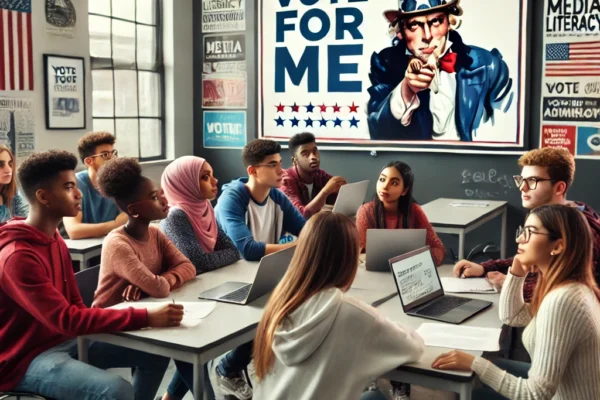
Classtimes
Class-time will be coordinated
Course Type
Description
In this dynamic, project-based ESL Level 3-4 course, students will dive into the world of media to explore how advertisements, social media, and public service announcements shape our beliefs, identities, and communities. By analyzing real-world media, students will uncover how persuasive techniques such as ethos, pathos, and logos are used to influence audiences—equipping them to navigate and critique the messages they encounter every day.
This course is culturally responsive, designed to reflect and honor the diverse experiences and voices of students. Through collaborative projects, students will connect the media’s messages to their own lives, creating personal campaigns that address issues relevant to their communities. From social justice to local change, students will have the opportunity to research and build media projects that reflect who they are and what they care about.
By the end of the course, students will create their own multimedia presentations and marketing campaigns, demonstrating how media can be used to inspire and persuade. These projects aren’t just class exercises—they’re real opportunities for students to use their voices to influence the world around them.
In today’s media-driven world, being able to decode, analyze, and create persuasive messages is essential for high schoolers. This course gives students the tools and platform to become not just consumers of media, but empowered creators—ready to shape the conversation in their communities and beyond.
State Standards
Common Core State Standards
RI.9-10.1
Cite strong and thorough textual evidence to support analysis of what the text explicitly says as well as inferences drawn from the text.
RI.9-10.2
Determine a central idea of a text and analyze its development over the course of the text, providing an objective summary.
RI.9-10.6 – Determine an author’s point of view or purpose in a text and analyze how an author uses rhetoric to advance that point of view or purpose.
W.9-10.1
Write arguments to support claims with valid reasoning and relevant evidence.
W.9-10.4
Produce clear and coherent writing appropriate to task, purpose, and audience.
SL.9-10.1
Participate effectively in discussions, building on others’ ideas and expressing their own clearly.
L.9-10.1
Demonstrate command of the conventions of standard English grammar and usage when writing or speaking.
WIDA ELD Standards
ELD-LA.9-12.Argue.Interpretive
Multilingual learners will interpret language arts arguments by analyzing the use of rhetoric and details to advance a point of view.
ELD-LA.9-12.Argue.Expressive
Multilingual learners will construct arguments that support claims with valid reasoning and evidence.
ELD-LA.9-12.Explain.Interpretive
Multilingual learners will interpret texts that explain processes, events, or phenomena.
ELD-LA.9-12.Explain.Expressive
Multilingual learners will express their understanding by organizing explanations logically and using discipline-specific vocabulary.
ELD-SI.9-12
Engage in discussions that involve sharing perspectives and reasoning through complex social issues.
Massachusetts Curriculum Frameworks (State Standards)
RI.9-10.2
Analyze a central idea of a text and how it is shaped by specific details; provide an objective summary.
W.9-10.2
Write informative/explanatory texts to examine and convey complex ideas clearly and accurately.
L.9-10.3
Apply knowledge of language to understand how it functions in different contexts and to make effective choices for meaning or style.
SL.9-10.1
Initiate and participate in a range of collaborative discussions with diverse partners on topics, texts, and issues, expressing ideas clearly and persuasively.
Supports Available to Students
Tier 1 (Supports provided to ALL students)
Language Supports
- Sentence Frames and Starters: Provide students with structured sentence frames to support their writing and oral responses, such as: This advertisement is an example of ____ because…
- Visual Aids and Multimedia: Use videos, images, and graphic organizers to reinforce concepts visually and make abstract ideas more concrete.
- Key Vocabulary: Pre-teach and frequently review key terms (e.g., persuasion, ethos, pathos) with multilingual definitions and usage examples.
- Chunking Texts: Break down complex readings into smaller, more manageable parts, with guiding questions for each section to ensure comprehension.
- Word Banks: Provide students with relevant vocabulary lists to support discussions and writing tasks.
Instructional Supports
- Differentiated Instruction: Tailor instruction to address different learning styles and language proficiencies, including the use of collaborative activities, independent research, and hands-on projects.
- Collaborative Learning: Foster peer interactions through group work, partner discussions, and peer reviews to promote language acquisition through meaningful conversations.
- Modeling and Demonstration: Model writing and analysis processes, such as how to break down an advertisement or write a claim-evidence-reasoning paragraph.
- Access to Technology: Leverage tools like Google Docs, Canva, and video creation platforms to enable students to engage with content creatively and collaboratively.
Cultural and Linguistic Responsiveness
- Culturally Relevant Content: Incorporate examples, texts, and media that reflect the diverse cultural backgrounds of students, making the content more relatable and meaningful.
- Multilingual Scaffolds: Offer multilingual glossaries, translations for key terms, and optional first-language supports to facilitate comprehension without sacrificing English language development.
Assessment and Feedback
- Frequent Formative Assessments: Use low-stakes quizzes, exit tickets, and student reflections to gauge understanding and adjust instruction as needed.
- Rubrics with Clear Criteria: Provide rubrics that break down expectations for assignments, making it easier for students to understand how their work will be evaluated.
- Student Self-Assessment: Include opportunities for students to reflect on their learning and identify areas where they may need more support or clarification.
Tier 2 (Supports provided to targeted SMALLER groups of students)
Synchronous Supports
- Small Group Instruction: Use virtual breakout rooms for more focused instruction on specific skills or content.
- Guided Practice: Teachers provide real-time feedback in smaller groups or one-on-one within breakout rooms.
Asynchronous Supports
- Vocabulary Tools: Platforms like Quizlet or Google Classroom for digital vocabulary practice and quizzes.
- Instructional Videos: Pre-recorded video lessons and tutorials that students can revisit as needed.
- Graphic Organizers: Digital tools like Google Docs to help students organize ideas and scaffold assignments.
- Detailed Feedback: Teachers offer personalized written feedback on assignments through Google Docs or Classroom.
Combined Supports
- Peer Review & Collaboration: Students give and receive feedback on digital assignments or participate in online collaborative projects.
- Progress Monitoring: Use of online assessments, quizzes, and reflections to track student progress and provide feedback.” “-Individualized Instruction: Customized lessons focusing on particular language skills or content areas where the student requires additional assistance.
Tier 3 (Intensive supports provided to SMALL groups or INDIVIDUAL students)
- Individualized Instruction: Customized lessons focusing on particular language skills or content areas where the student requires additional assistance.
- Increased Interaction: More frequent one-on-one sessions with the instructor to address specific learning obstacles and provide personalized feedback.
- Specialized Resources: Access to tools and materials that target the student’s unique learning needs, such as advanced language software or specialized reading materials.
- Progress Monitoring: Regular assessments to evaluate the effectiveness of interventions and adjust strategies accordingly.
Skills-learned
- Media Literacy and Critical Thinking Skills
- Argumentative Writing, Communication, and Advocacy Skills
- Cultural Awareness, Self-Expression, and Advocacy for Change

About Zach English
Zach has taught ESL, Spanish, Social Studies, Sex Ed, and Health and Wellness in Spain and Boston. He now teaches ESL and Health in Wellness at Mary Lyon Pilot High School. He is a graduate of Umass Dartmouth, attended the University of Granada, Spain, and is a Lifeguard/Divemaster for the Red Cross. He has lived all around the world and loves to bring different perspectives into the classroom to motivate students and encourage them to explore new opportunities. He loves to spend his free time traveling, meeting new people, learning new languages, and hiking. He champions nerd culture and meaningful conversations.